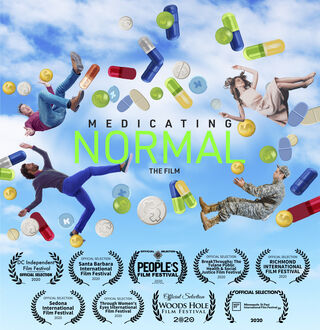Psychiatry
Medicating Normal: A Film Review
A compelling new documentary weighs the toll of overprescribing.
Posted July 20, 2020 Reviewed by Lybi Ma

A newly married couple struggles to withdraw from years of taking prescribed psychostimulants and benzodiazepines. A female combat veteran recently back from Iraq is prescribed a “cocktail” of drugs for a crisis found to lie in grief and shock. A New York waitress with sleep problems ends up in a six-year battle to quit a benzodiazepine she has taken as prescribed. A teenager anxious about school is given two different antidepressants to “kickstart” talk therapy and, weeks later, is hallucinating about committing grievous self-harm.
These are the stories that make up Medicating Normal, a compelling new documentary from Periscope Moving Pictures and directors Lynn Cunningham and Wendy Ractliffe that weighs the toll of overprescribing on a scale both national and human.
Fast-paced and well-made, the film opens to the newly married couple opening a lockbox full of prescribed drugs—the kind that husband David, a former Lt. Commander in the U.S. Navy, had threatened to swallow months earlier in a suicide attempt, from grief over his emotional flatness, numbness, and sexual dysfunction. He had taken medication as prescribed for several months—considerably longer than the 2-4 weeks for which treatment is authorized. Even on his wedding day, he remembers telling his mother of his drug-induced malaise, “I feel nothing. I feel emotionally void.”

The film cuts to the Massachusetts State House, Boston, to footage of David giving testimony during a public hearing on H4062, a 2015-16 bill still awaiting final approval that would require informed consent for the prescribing of benzodiazepines. He tells the assembled lawmakers, “The indisputable reality of short-term usefulness and long-term risk demands that patients receive explicit informed consent prior to benzodiazepine prescription.”
It is a theme that recurs over and again in this powerful film—drugs licensed only for short-term use end up prescribed for months, sometimes years, due to a host of factors. They include prescriber ignorance, misattributed symptoms, dependency interpreted as a resurgence of the underlying condition, and acute, months-long withdrawal symptoms, even after a necessarily slow and gradual tapering involving micro-reductions in dose.
Committed to investigating the current evidence base in academic psychiatry—including that antidepressant-use in the U.S. rose by 400 percent between 1994 and 2008, with 23 percent of women in their 40s and 50s reporting that in 2011 they took an antidepressant—the film looks at overprescribing from several angles: the influence of drug marketing; the history and controversy of DSM expansion; and how both have influenced the “story” that Americans describe about the origins of pain and suffering and their best treatment. It draws on interviews with noted experts, including Allen Frances, Anna Lembke, Peter Gøtzsche, Robert Whitaker, and David Cohen, amassing enough detail and documented facts for the viewer to witness the spiraling effects of a complex, faulty system on diverse Americans with real-world problems.
Notes Lembke, Professor of Psychiatry at Stanford Medical School and a specialist in how benzodiazepines and opioids affect the brain and central nervous system, “It’s very clear that there is a cohort of patients for whom getting off these drugs is exquisitely painful.”

“Very clear”—yet we cut to pharmacist Ivan Jourdain reacting with concern and frustration as Shalamar, the New Yorker with sleep problems, explains that she’s been taking a benzodiazepine, not for short-term use, as the package insert stipulates, but for 6.5 years.
Shalamar later confronts her Brooklyn-based prescriber for not warning her that the drugs are widely associated with dependency. He tells her in a frank exchange worth repeating (she is wearing a hidden camera):
“Unfortunately, a lot of people take benzos these days, and they don’t want to come off.”
“They can’t come off…”
“No, no, they can. It’s just a lot of people cannot work up the determination. It’s not about benzos; it’s about determination. It’s never chemical. It’s never chemical that controls you.”
The prescriber’s emphatic rejection of chemical dependency—coupled with his moralizing over willpower—effectively blames Shalamar for her problems discontinuing the drug. In his eyes, it also exempts him from all responsibility and liability in prescribing it.
“It’s never chemical.” This may surprise those hearing more or less continuously for more than three decades that their suffering and distress are entirely chemical. (The discredited “chemical imbalance” theory still circulates widely online and among practitioners.) The problem is described as chemical, in short, until a drug treatment generates dependency, at which point it stops being chemical at all.
Later still, Shalamar hears from a specialist in corporate law that patent expiration essentially puts the makers of generic drugs beyond legal accountability.

If drugmakers and prescribers refuse all responsibility for such overprescribing, who ultimately bears responsibility for its effects and harms? The interview with DSM-IV Chair Allen Frances is notable and disappointing in this regard, much of it answered in the passive voice. Frances pins the blame on the drug industry but declines to see the DSM as the industry’s practical enabler, its loosened diagnostic thresholds, relaxed criteria, designated comorbidities, and massive expansion more than doubling in 26 years the number of mental disorders said to exist. All these factors have been instrumental in driving overdiagnosis nationwide and worldwide.
The interview with Frances makes clear that, for academic psychiatry, the patient alone ultimately bears the physical and psychological toll of dependency on prescribed medication.
In its ability to connect these parts of the puzzle and put them at a human scale, the film gives a powerful lesson on suffering and its misattribution.
Partly because prescribed drugs are routinely invoked as the best remedy for suffering, they are rarely seen as the underlying problem, even as a co-factor in deterioration. Instead, through what one commentator calls “an archaic process of trial and error only an alchemist would attempt,” prescribers try higher doses and different classes of medication, often in combination, turning their secondary effects into a rationale for further prescribing.
“When they get on these medications, and they begin to deteriorate,” cautions Mary Neal Vieten, a Commander in the U.S. Navy who treats soldiers and veterans with PTSD, “the attribution is to their mental condition as opposed to the medication.” “You just see this pattern,” she notes of a classic prescription cascade, whereby the deterioration is attributed entirely to a worsened mental state. It’s very rare, she says, for the doctors to conclude, “Your drug may be your problem!”
In a thoughtful review of the film posted to his blog, Case Western Reserve psychiatrist Awais Aftab, editor of the “Conversations in Critical Psychiatry” series for Psychiatric Times, affirms both the scale of the problem and the film’s assessment of its several causes:
"The clinical practice and prescribing patterns that we get to see in the documentary fall well below the standards of good psychiatric practice that I was taught as a resident as well as standards that are enshrined in current practice guidelines. So many psychiatrists can reasonably protest that what happened to the individuals in the documentary was not supposed to happen. Yet it is also the case that it did happen and that it has happened and continues to happen to a woefully large number of individuals across the world" (emphases in original).
“What we are witnessing” in the film, Aftab concludes, is a failure "on such a massive scale such that the only thing left for ex-patients/survivors and other concerned citizens to do is to take up the mantle themselves, armed with their personal experiences and the tools and information at their disposal. They were sold a hollow understanding of their distress, and they were offered cures which turned out to be poisons for them, and now they are reclaiming their stories.”
These are striking words from a psychiatrist well-placed to help influence the profession and its practices. The self-criticism he implies as necessary profession-wide includes an adjusted perspective on withdrawal from psychiatric drugs and the avoidable harm of overprescribing. It also involves listening to patients and survivors who contest the accuracy and validity of diagnoses they received, often within minutes of describing their distress, as well as the efficacy of treatments prescribed as a result—harms too often dismissed as “anecdotal evidence.”
“The conversation has moved into the community,” Aftab observes, and Medicating Normal will hasten its delivery and enrich the discussion by documenting just how pervasive and life-altering are the failures detailed.
“We hope to show the film at medical schools and to mental health trainings,” co-director Wendy Ractliffe tells me. “We have done 80 community screenings, about 25 of them virtual, and numerous film festivals. People can find upcoming screenings to buy tickets on our website, and the film will go online in January. We hope to be on European TV also in the fall.”
An official selection for multiple international independent film festivals, the film is a must-see for audiences involved in mental health and prescribing, including medical students, psychiatrists, and clinical psychologists concerned their treatments are causing harm. It’s also a film every American with any connection to psychiatric medication urgently needs to see.
References
Medicating Normal (Periscope Moving Pictures) — Documentary Website and Official Trailer




